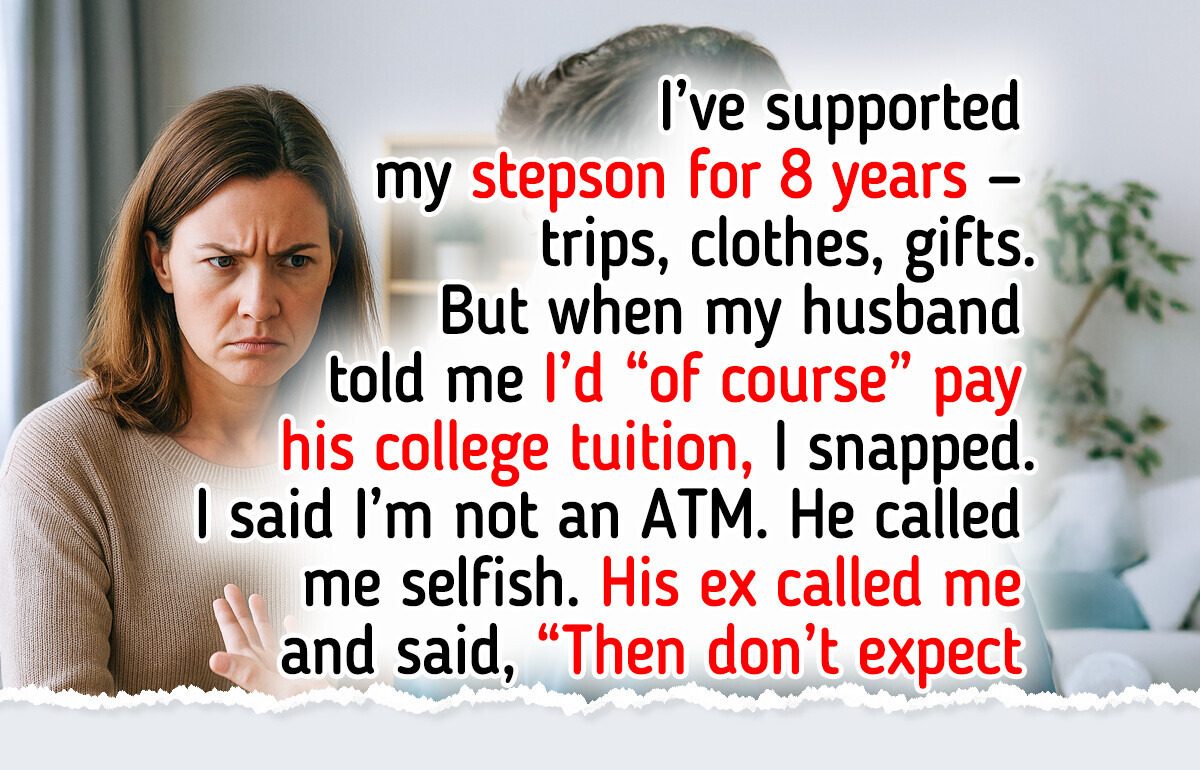The fact that this expectation hadn't been talked about before is not right. And how dare his mother call you our on this at all is crazy. I understand completely it being about the expectations. Adults normally discuss multiple times throughout a child's life what paying for a college tuition is going to look like. That is very different than buying school wardrobes or bicycles and Christmas gifts. All 3 of you adults (or 4 if ex has remarried) need to come to the table and lay it all to bare
I Refused to Pay for My Stepson’s College—He’s Not My Responsibility

We recently received a letter from one of our readers who found herself in a situation many can relate to — torn between kindness and boundaries. After years of helping her husband’s son financially, she decided to say “no” for the first time. But that one word didn’t just cause an argument — it changed the way her whole family saw her.
Hi Bright Side!
I’ve been married to my husband for eight years. He has a son from his first marriage, who’s now 19. I’ve helped with everything — clothes, trips, his first car, even part of his summer courses. But when my husband said I’d “of course” help pay for his college tuition, like it was my obligation, something in me snapped.
I told him I’m not an ATM. He called me selfish. His ex said I was “ruining the boy’s chances at a future. Don’t expect to be a part of our family.”
But here’s what no one talks about — it’s not about the money. It’s about always being expected, never asked. About the way people start to treat your generosity like a duty.
Now my husband barely speaks to me. My stepson hasn’t called in weeks. The house feels quieter — heavier, somehow. Maybe I could’ve handled it differently, but for once, I chose to draw the line.
And honestly? I’m not even sure if that makes me cruel... or finally free.
What do you think? Am I wrong?
Best regards,
Sandra

Do Stepparents Have to Pay Financial Support? Understanding the Gray Areas.
The idea of a “traditional” family — mom, dad, and two kids — has evolved. Today, blended families are more common than ever, and with them come new questions about financial responsibility.
In many families, one partner often ends up supporting not only their own children but also their stepchildren. But what happens when the relationship ends? Are stepparents still expected to provide financial support?
Legally, biological parents have the primary duty to support their children. A stepparent is usually not required to pay maintenance. However, the answer isn’t always so simple.

The stepson's college education or trade school or whatever are HIS responsibility not the stepmom's or the bio parents. He is the one who benefits not them. I paid my own way with academic scholarships and grants and working 2-3 part time jobs while being a full time student. I needed student loans for medical school and still worked 1 part time job on weekends for the first 2 years. NO ONE would ever be able to say to me "if it wasn't for me you wouldn't be where you are today". I earned it on my own.
In certain cases, even a court can order a stepparent to contribute financially if it believes it’s appropriate. When making such a decision, the court considers factors like:
- The length and nature of the marriage
- The relationship between the stepparent and the child
- How financially dependent the child was on the stepparent
- Any special circumstances that make support necessary
If a court does impose financial responsibility, there’s no fixed formula for how much a stepparent must pay. The amount depends on several things, including:
- Each parent’s income and financial capacity
- The child’s needs and current support arrangements
- The level of financial involvement the stepparent had before
- Whether requiring payment would cause undue hardship
In essence, a stepparent’s obligation is secondary, but it can still become significant under certain conditions — especially when they’ve played a major role in the child’s upbringing.
If your relationship has ended, and you’ve been the main provider for your stepchild, you don’t have to navigate this uncertainty alone. It’s important to understand your rights, your limits, and your options — before emotions or assumptions decide for you.
Love can make you a parent, but it shouldn’t make you a victim. Knowing where your duty ends — and where your heart begins — can save everyone from more pain.
12 Stepparents Who Prove Real Family Isn’t About Flesh and Blood
Comments
It's good that your husband and his ex decided you're not part of the family. That means you don't have to support his kid anymore at all. That's only something you do for family. So I guess not only will they be funding his education now but all his other expenses too.
Related Reads
I Refuse to Forgive My Parents After They Took My Inheritance for Being Childless

I Cut Off My Adult Son—I’m His Father, Not His Never-Ending Wallet

I Refused to Be a Free Hotel for My Late Son’s Family: They Eclipsed My Life

10 Moments That Prove Kindness Prevails Even in an Unfair World

My Toxic Coworker Spread Lies About Me and Got Me Demoted—but I Got the Ultimate Victory

14 Friends Who Have a Black Belt in Creating Awkward Situations

I Refuse to Sacrifice My Career to Fund My Stepson’s Expenses

I Refuse to Be My Manager’s Maid Anymore—So I Gave Him a Taste of His Own Hygiene

My Mom Refused to Be Called Grandma, and My 6-Year-Old’s Response Was Unforgettable

12 Moments That Remind Us to Choose Kindness, Even When the World Is Falling Apart

11 MILs Who Stepped Up When Families Needed Them Most

I Refuse to Let My Boss Steal My Work Anymore, So I Decided to Play It Smart
